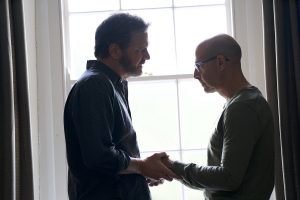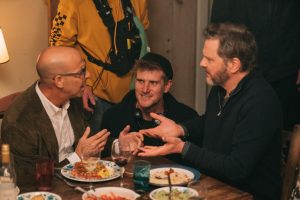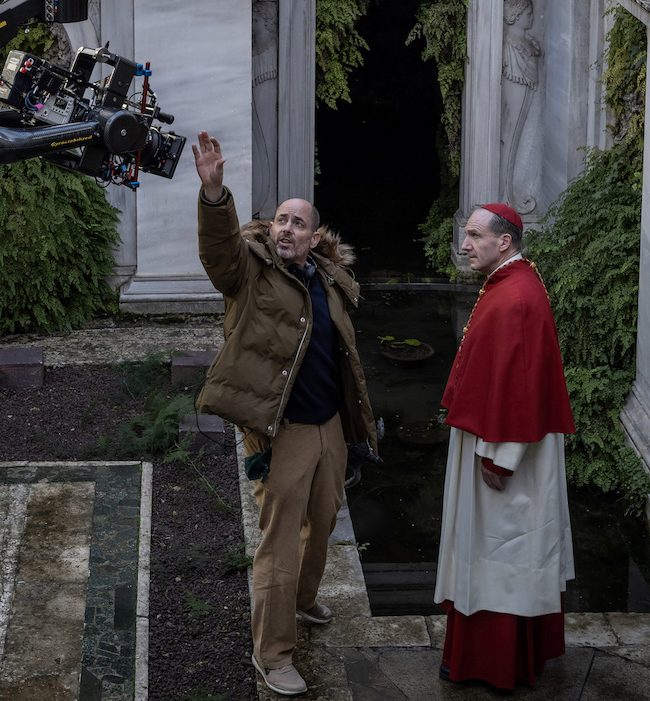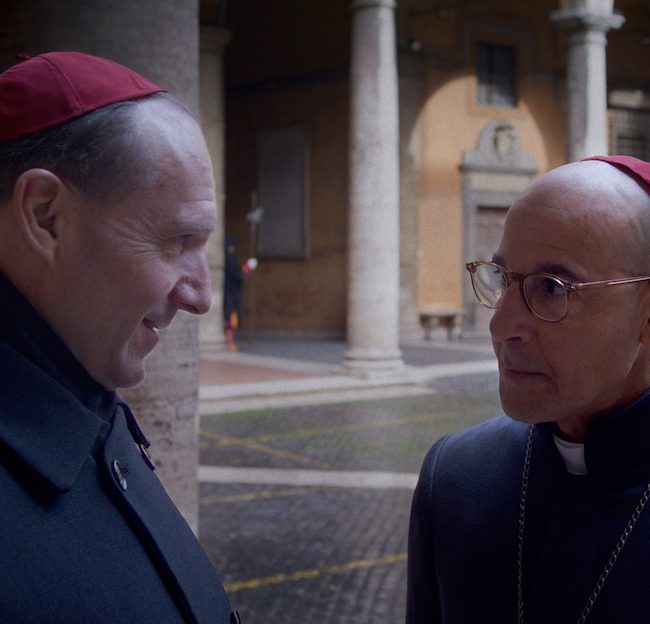A Conversation with Harry Macqueen (SUPERNOVA)

On the day of its U.S. release, I spoke with director Harry Macqueen (Hinterland) about his sophomore feature Supernova (which I also reviewed). The film follows Colin Firth and Stanley Tucci as an aging long-term couple taking a tour of England’s northern Lake District before one of them further succumbs to early-onset Alzheimer’s. Beautifully acted and photographed, the movie further distinguishes itself by never once discussing its characters’ sexual orientation. That is not where the drama lies, but rather in the pain of confronting impending loss. Here is a condensed digest of our conversation, edited for length and clarity.
Hammer to Nail: What was the genesis of this idea? Did it start out being about a straight couple and then morph into what we now have, or did you always intend to focus on an aging gay couple going through this particular crisis?
Harry Macqueen: Well, the genesis of the idea came from personal experience. A couple of things happened to me that sort of brought young-onset dementia into my life. Then, after that, I was so affected that I wanted to learn more about it, so I did quite a lot of volunteering over the course of about two years, and spent a lot of time with people who are living with this kind of condition; families and couples and people on their own. It’s a story inspired by all of those experiences that I had and those people that I met. And I think when I was first writing the screenplay, right at the start, the couple was, briefly, a heterosexual couple. I think largely that was because I hadn’t actually worked with any same-sex couples during my research, so it just felt natural to sort of go with what I knew.
But almost immediately, I kind of countered that and wanted to challenge that. So it just seemed quite an important thing, quite an important choice to make, actually, because ultimately, of course, the film deals with a lot of universal themes: love, loss, companionship and trust, things like that. It didn’t seem to me important at all what sexuality the characters were. I also hadn’t seen, I don’t think, a film about romantic, kind of mature, same-sex love, hardly ever, really. So I think I felt that that was quite an important, and original, and hopefully quite progressive thing to investigate.
HtN: I’m curious, did you always intend to film in the Lake District? I’ve never been, and this may not have been your intent, but your film is a wonderful advertisement for the area’s tourism industry. It’s beautiful, and you photographed it beautifully, and now I want to go. (laughs)
HM: (laughs) Yeah, we missed a trick, really. We should’ve got some of the budget paid for by the tourism department of the Lake District. (laughs) Yes, though, I did actually always intend to film there. I wrote some of it when I was up there. I’ve got some family that live up there, and it’s an area that I’ve gotten to know quite well in the last 10 years or so. But it’s a really amazing, beautiful place, obviously. And strangely, people don’t film there as much as you’d expect that they would for somewhere that looks like it does. So it’s a landscape that really inspired the script, and we were really lucky in the end to be able to film there because obviously that doesn’t always happen.
But yeah, it’s an inspiring landscape, and I think the way that we try to use the landscape in the film obviously is a counterpoint to the intimacy of the central relationship, which is a big, big part of it. The sort of micro against the macro, thematically and also literally. But it’s also a beautiful, but quite brutal, environment, and I think that’s important for a film like this. That it doesn’t become too much of a kind of chocolate-box quintessential English environment. It has to be quite unnerving, as well.
HtN: It is very much. I’ve been to Scotland, and I find that scenery amazing. This is not that far from Scotland, and it’s really quite stunning. What about the casting? How did you get Colin Firth and Stanley Tucci on board? This is only your second feature, so I’m impressed.
HM: Yeah, it was a bit of a dream come true, obviously. But it was actually quite straightforward, strangely. We got the script to Stanley and he really loved it. I mean, that’s the honest answer, and he really fell in love with the characters, and then wanted to meet me, so we met and we got on, and then he suggested Colin. I’d always wanted to make the film, if I could, with two actors that had a shared history, because it’s an intense and intimate film and it’s quite challenging, performatively. As an actor, myself, I know that if you’re working with people that you get on with, it helps when you’re doing stuff like that. And I didn’t know that they were good friends, but they’re obviously best, best, best friends. And I didn’t know it at the time, but Stanley had actually given the script to Colin, already, and Colin really liked it, too. So it came together quite quickly after that.

Colin Firth & Stanley Tucci in SUPERNOVA
HtN: I appreciate the fact that, unlike a lot of other films about gay couples, old or young, that their homosexuality is not the crisis here. It’s just a comfortable background. It’s nice to have a film where that’s not the issue. How did you work on that relationship with the actors? Obviously, they’re best friends, but how did you work on getting that sense of long years together? Because I really like that aspect of the film, just this general sense of believing that we are with a couple that’s been together for 30 years.
HM: Thank you. I’m glad that you did believe it, because I think, to be honest, that’s what the film lives and dies on, really. I mean, especially for a film like this that very deliberately doesn’t show the characters in their natural environment, or doesn’t flash back on anything like that. You’re thrown in at the deep end with them on this journey, and it’s crucial to the film that you believe in them as individuals, and in the central relationship. A lot of it’s in the script. I mean, a lot of it has to be woven into the texture of how you write something and the atmosphere of that.
But then Colin, Stanley and I just worked incredibly hard on it. That’s the honest truth. Colin and Stanley naturally brought a lot of their 20-year relationship to this relationship, and they love each other, quite honestly, and you can really tell that it’s genuine. It’s there. It’s authentic, anyway. But also, a lot of the job is then about sort of throwing away all of the aspects of their relationship and them as people, obviously, that are not relevant to these characters or their situation, and that’s really difficult.
It was really very much a team effort. And I think one of the things that struck Colin and Stanley, right at the start of the process, was how much of that was evident in the script. It really appealed to them as a team, as a friendship team, if you like, because it was there already, that history, and that obviously extends to all the other departments, too. You know, the production design of the van, for instance, is integral to knowing who these people are in their normal life. All of that has to paint that picture and do it seamlessly, which is hard.
HtN: You stole my next question, because I was very curious about the RV and how you worked with the production designer to create that space. What were some of the ways in which you and the production designer worked to make that van feel lived-in?
HM: Well, firstly, we had to find the right van. We’d made a decision early on, myself and Dick [Pope], the cinematographer, that whatever van we bought we weren’t going to rip it to pieces and put it back together again. And we weren’t going to shoot in a studio. We weren’t going to take walls out so that we could get cameras in more comfortably. We were going to shoot in there, and the actors were going to be in there, and everyone was going to be in there just because we thought that level of authenticity was really important. And I’m really glad we did that.

Stanley Tucci, director Harry Macqueen & Colin Firth
But what that does mean is that you have to find the right space and then make it work for you. So Sarah Finlay, the production designer, and her team, re-dressed the whole of the inside. The color palette on the inside, for instance, was warmed, and sort of re-wallpapered, and all that, reupholstered, and stuff like that. We made all of the constituent parts of the van – the bed, the cooker –modular, so they were working and real but we could take them out and put a camera in there when we wanted to.
We did an awful lot of work to find out what these guys would have in terms of utensils, what books would be on the bookshelf, what kind of curtains would they have put in there, whatever. And we did that work with the actors, obviously, too. Then you dress it in such a way that you hope is kind of effortlessly painting a picture of who these guys are and what they’ve been through, making it lived-in and kind of idiosyncratic.
HtN: Down to the detail of the dog, himself, who looks particularly lived-in, as well; not a puppy, but a nice, comfortable, sort of frumpy dog.
HM: Yeah, exactly. That was the casting breakdown for that role. (laughs)
HtN: Why the titular metaphor of the supernova? I mean, obviously, a supernova gets really bright right before it then goes down. But what made you land on that, and did Tucci’s character Tusker’s interest in astronomy come from that? And you have a lot of stars seen in the movie, too. You open with a view of the stars, and then at the end, Colin Firth is on the ground, looking up.
HM: Well, it’s all sorts of reasons, really. I mean, the most obvious is that, yes, it sort of represents, in my view, that their relationship and Tusker, Stanley’s character … it’s something that’s burning very brightly, but dying, and that’s certainly what I think Tusker is doing, and indeed their relationship is doing. And because of that, it seemed therefore to make sense to kind of weave in a sort of secondary narrative of them enjoying looking at the stars. And naturally, if you’ve got someone who is considering their mortality, then they are considering the bigger questions in life, perhaps, and looking up and thinking, as it were. Also, because I think it seemed like a really interesting cinematic counterpoint to how “small” the film is. It’s a small indie movie made for not a huge amount of money that takes place mostly in a small little RV. And I think it felt like an interesting cinematic parallel that there was also something much bigger at play within the film.
HtN: Well, Harry Macqueen, I want to thank you for making the film. I really enjoyed it. If you are ever in the Lake District and see a bald American driving around in an RV, you’ll know why.
HM: Thanks, man. I’ll be sure to say hello.
– Christopher Llewellyn Reed (@ChrisReedFilm)











